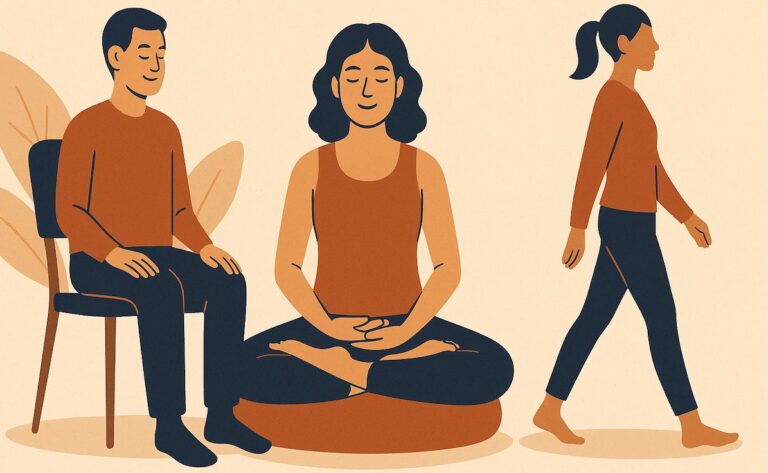Okay, you know how to meditate (at least the basics!), but when should you do it? First thing in the morning? Right before bed? And for how long? Five minutes? An hour? Does it have to be every day?
These are common and important questions! Finding a sustainable rhythm is key to building a consistent practice. Let’s explore the best time to meditate, how long your sessions should be, and why starting small often leads to the biggest long-term gains.
The Early Bird: Benefits of Morning Meditation
Many people swear by meditating first thing in the morning.
- Why it Works:
- Sets the Tone: Starting your day with intention and calm can positively influence how you handle stress later on.
- Quieter Mind (Usually): Before the day’s demands kick in, your mind might be slightly less cluttered.
- Fewer Obstacles: It gets done before other things inevitably pop up and derail your plans.
- Tip: Try meditating soon after waking up, perhaps before checking your phone or email.
Winding Down: The Power of Evening or Bedtime Meditation
Meditating at night is another popular choice, especially for those seeking better sleep.
- Why it Works:
- Decompression: Helps release the stress and tension accumulated throughout the day.
- Transition to Sleep: Calms the nervous system, making it easier to fall asleep (especially helpful if you struggle with racing thoughts).
- Reflection: Can be a time for gratitude or gentle reflection on the day.
- Tip: Meditate after you’ve finished your main evening tasks, as a clear transition towards rest.
Morning vs. Night: Which is Truly Best?
Honestly? The best time to meditate is the time you will actually do it consistently.
- Experiment: Try both morning and evening for a week each. Which feels more natural? Which are you more likely to stick with?
- Any Time Works: Even a few minutes during a lunch break or before dinner can be incredibly beneficial. Don’t let the “ideal” time become a barrier.
How Long Should You Meditate? Start Small!
This trips up many beginners who think they need to sit for 30 minutes or an hour right away.
- The Magic of 3-5 Minutes: When starting, aim for just 3, 5, or maybe 10 minutes max. Why?
- Achievable: It’s easy to fit into a busy schedule.
- Builds Momentum: Success breeds success. Consistently hitting a 5-minute goal feels better than aiming for 30 and quitting after two days.
- Train Consistency: You’re building the habit muscle first.
- Gradually Increase (If You Want): Once you’re comfortable and consistent with shorter sessions, you can gradually add a few minutes if you feel drawn to it. Listen to your own experience, not external pressure.
- Key Takeaway: Consistency over duration, especially at the start!
How Often? Aiming for Daily (But Don’t Sweat Perfection)
Ideally, meditating every day, even for just a few minutes, creates the most significant impact over time. It’s like physical exercise, regular practice yields the best results.
- Why Daily? It keeps the skill sharp, integrates mindfulness more deeply into your life, and compounds the benefits.
- Life Happens: If you miss a day, don’t beat yourself up! Just gently return to your practice the next day. Aim for daily, but practice self-compassion when life intervenes. Meditating multiple times a day (e.g., 5 min morning, 5 min evening) can also be powerful.
Timing Around Food and Exercise:
- Meditating on an Empty Stomach? Many traditions recommend meditating before eating, as digestion can sometimes make you feel sluggish or distracted. However, if you’re feeling faint or intensely hungry, that’s also distracting! Find what works best for your body. A light snack beforehand is usually fine if needed. Don’t meditate immediately after a very heavy meal.
- Meditating Before or After Exercise? Both have benefits!
- Before Exercise: Can help you approach your workout with more focus and intention.
- After Exercise: Can help calm the body and mind, integrating the physical activity.
- Experiment and see which flow you prefer.
Conclusion: Find Your Personal Rhythm
There’s no one-size-fits-all answer to the perfect meditation schedule. The most effective plan is the one you can realistically and consistently integrate into your unique life. Start small, experiment with timing, prioritize consistency over duration, and be kind to yourself throughout the process. Your ideal rhythm will emerge with practice.




